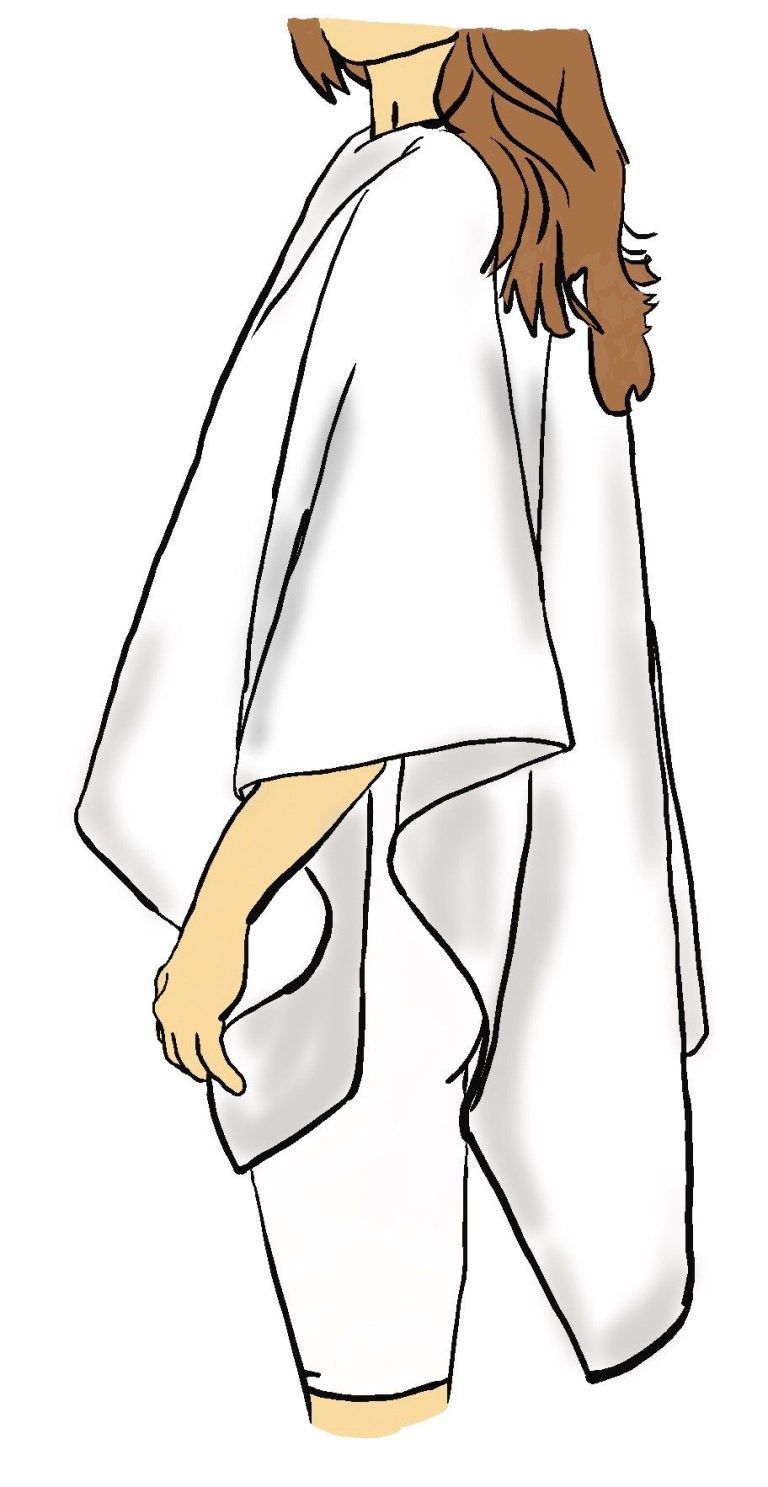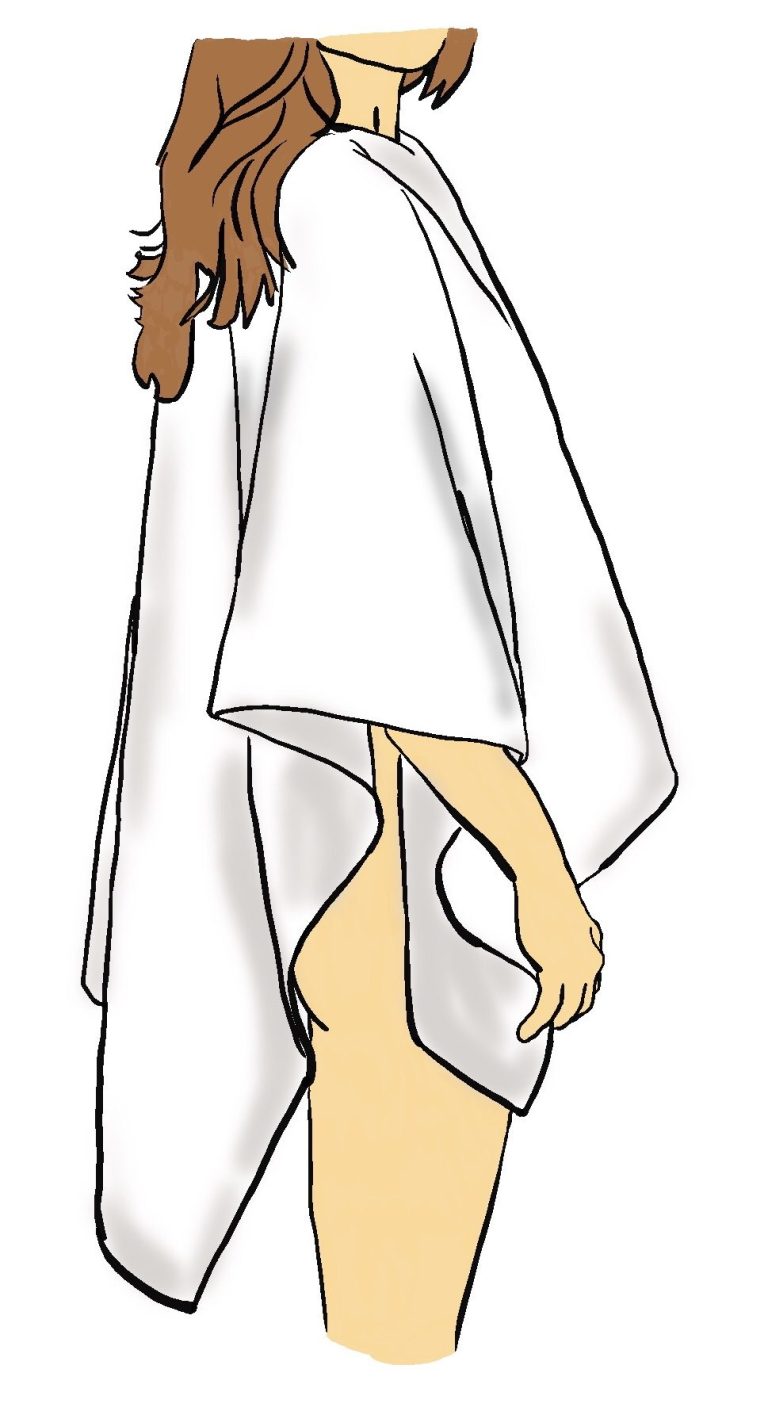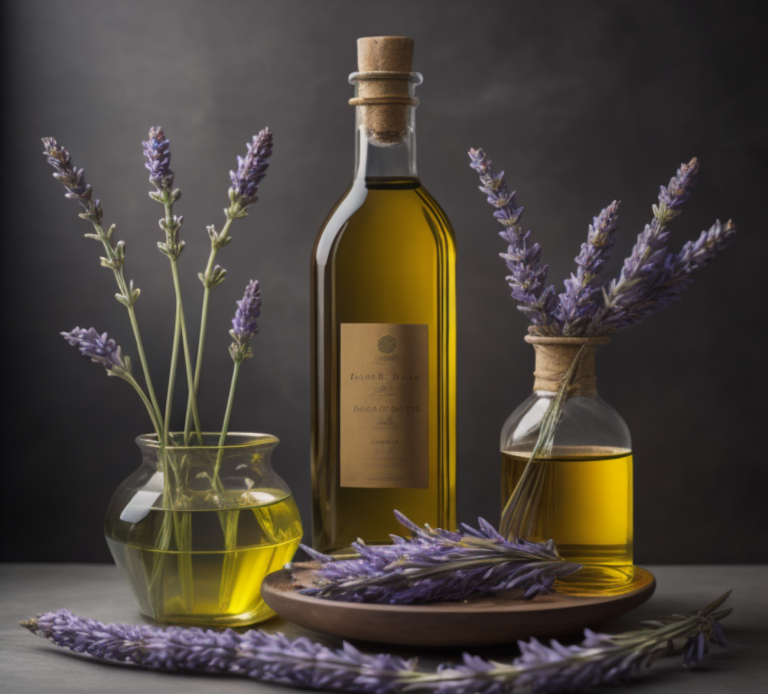
Initiatory
Washing and Anointings
The Initiatory ritual is a precursor for the Endowment. What is this ritual? How as it changed over the years?
Clothing
during the "Initiatory" ceremony

White dress
Present day
Today during the ceremony of the Initiatory, temple patrons can wear whatever (temple appropriate) white dress/suit they want with their garments underneath. They simply change from their normal Sunday attire and into their white clothes.
Garments under shield
After 2005
After 2005, the temple patrons were instructed to put on their garments (underwear) beneath the shield during the Initiatory. The shield was very much like a thick, white poncho.


Shield/Naked
Prior to 2005
Beginning in the early 20th century, the temple patrons wore a shield during the entire Initiatory with no clothing underneath.
Completely naked
1836 until the early 20th century
Originally during this part of the ceremony, the temple patrons were completely naked.
The illustration comes from Alfred Trumble's book titled "The Mysteries of Mormonism" pg. 6.

The Washings
during the "Initiatory" ceremony

Drop of water
on the forehead
Present day
Today, during “the washing” a temple worker puts a drop of water on their index and middle finger and simple touch the person's forehead.
Bathtub
Early 1900s
During the early 1900s, the patrons would climb into a large tub of water and a temple worker would then wash them.
This image is of a bathtub in the Salt Lake Temple in 1912.


Troughs
1800s
During the 1800s, the patrons would climb into a large tub of water and a temple worker would then wash them. Heber C. Kimball, in his journal, says that they bought stoves to heat up the water and two new troughs large enough so that three men could be washed at one time.
Ann Eliza Webb's temple experience
Published in 1876; Endowed about 1861
In her book Ann Eliza shares her experience with the washing: “In our room were several large tubs filled with water, and Miss Eliza R. Snow and two or three other women were in attendance. I was received by Miss Snow, who placed me in one of the tubs, and washed me from my head to my feet, repeating certain formulae to the effect that I was washed clean from the blood of this generation, and if I remained firm in the faith, should never be harmed by any of the ills that beset the world, and which soon were to be showered in terrible profusion upon the earth. Plagues, pestilence and famine should cover the earth, and be let loose in its every corner, but I should be passed by unscathed, if I was true to my religion — the only revealed religion of God.” After this washing, she was “wiped dry.” [Wife No. 19, pg. 358].
Mary Ettie Smith's temple experience
Published in 1860
Another writer, named Mary Ettie Smith, gave her experience in her own expose:
“Here we were undressed and washed in a large tub of warm water, by a woman who is "ordained " to that office…”
[Fifteen Years Among the Mormons by Mary Ettie Smith, pg. 47]
The Anointings
during the "Initiatory" ceremony
Early Mormon Leaders
Bathed in Whiskey
This video comes from Oliver Cowdery's Ohio Sketchbook, written on January 16th of 1836.
Initiatory in 1836
The following entry comes from Oliver Cowdery's Kirtland Ohio Sketchbook. The Kirtland Temple was completed between 1833 andn 1836. For whatever reason, the early church leaders performed their initiatories outside of the temple in Joseph Smith's home.
Post Script to Saturday the 16th.
Met in the evening with bro. Joseph Smith, jr. at his house, in company with bro. John Corrill, and after pure water was prepared, called upon the Lord and proceeded to wash each other’s bodies, and bathe the same with whiskey, perfumed with cinnamon. This we did that we might be clean before the Lord for the Sabbath, confessing our sins and covenanting to be faithful to God. While performing this washing unto the Lord with solemnity, our minds were filled with many reflections upon the propriety of the same, and how the priests anciently used to wash always before ministering before the Lord. As we had nearly finished this purification, bro. Martin Harris came in and was also washed.

Use of "cow horn"
Present day
Today, during “the anointing” a temple worker puts a drop of oil on the head of the patron. The temple worker then blesses the patron and soon another worker joins and blesses also.
Their own bottles of oil
Mid/Late 1800s
In the late 1800s, the temple patrons were required to bring their own bottles of the best olive oil.
After being dried from their washing, the temple patrons were literally anointed with oil on nearly every part of their naked body.


Oil scented with lavender
The oil was later scented with lavender, presumably to help temple patrons during the anointing.
Ann Eliza Webb's anointing experience
The following story comes from Ann Eliza Webb. She was endowed when she was seventeen years old as a means to help her heal from sickness. The following is found in her book, Wife No. 19.
When I entered the Endowment-House, I was made, first of all, to take off my shoes, for the place was too holy to be desecrated by outside dust. Having done this, I gave my name and age, the names of my parents, and date of baptism and confirmation, to the officiating clerk, who entered them all in a large book. Several other persons of both sexes were present, and after all had been similarly catechized, and their answers noted, we were asked to produce our bottles of oil, — for we had been instructed, among other things, to bring with us a bottle of the best olive-oil: these were taken from us; our bundles of clothing were handed to us again, and we were told to "pass on."
We entered a large bath-room, which was separated in the middle by a heavy curtain, for the purpose of dividing the men from the women. The men passed to one side of the curtain, the women to the other. In our room were several large tubs filled with water, and Miss Eliza R. Snow and two or three other women were in attendance. I was received by Miss Snow, who placed me in one of the tubs, and washed me from my head to my feet, repeating certain formulae to the effect that I was washed clean from the blood of this generation, and if I remained firm in the faith, should never be harmed by any of the ills that beset the world, and which soon were to be showered in terrible profusion upon the earth. Plagues, pestilence and famine should cover the earth, and be let loose in its every corner, but I should be passed by unscathed, if I was true to my religion — the only revealed religion of God. After I had been wiped dry, she proceeded to anoint me with olive-oil. As she did so, she repeated, solemnly, —
'Sister, I anoint your head, that it may be prepared for that crown of glory awaiting you as a faithful Saint, and the fruitful wife of a priest of the Lord ; your forehead, that your brain may be quick of discernment ; your eyes, that they may be quick to perceive the truth, and to avoid the snares of the enemy; your ears, that they may be quick to hear the word of the Lord; your mouth, that you may with wisdom speak the words of eternal life, and show forth the praise of the immortal gods; your tongue, to pronounce the true name which will admit you hereafter behind the veil, and by which you will be known in the celestial kingdom. I anoint your arms to labor in the cause of righteousness, and your hands to be strong in building up the kingdom of God by all manner of profitable works. I anoint your breasts, that you may prove a fruitful vine to nourish a strong race of swift witnesses, earnest in the defence of Zion; your body, to present it an acceptable tabernacle when you come to pass behind the veil; your loins, that you may bring forth a numerous race to crown you with eternal glory, and strengthen the heavenly kingdom of your husband, your master, and crown in the Lord. I anoint your knees, on which to prostrate yourself, and humbly receive the truth from God's holy priesthood; your feet, to run swiftly in the ways of righteousness, and stand firm upon the appointed places. And now I pronounce your body an acceptable temple for the indwelling of the Holy Spirit."
As may be imagined, I was literally besmeared with oil from my head to my feet. I breathed it, smelled it, tasted it; it ran into my eyes, and made them smart fearfully, and dripped in any but an agreeable manner from my hair. I was fairly saturated with it; was cognizant of nothing else; and I was so nauseated from it that I could scarcely go on with the ceremonies. I got a distaste for it then that I have never got over, and to this day even the sight of it makes me ill.